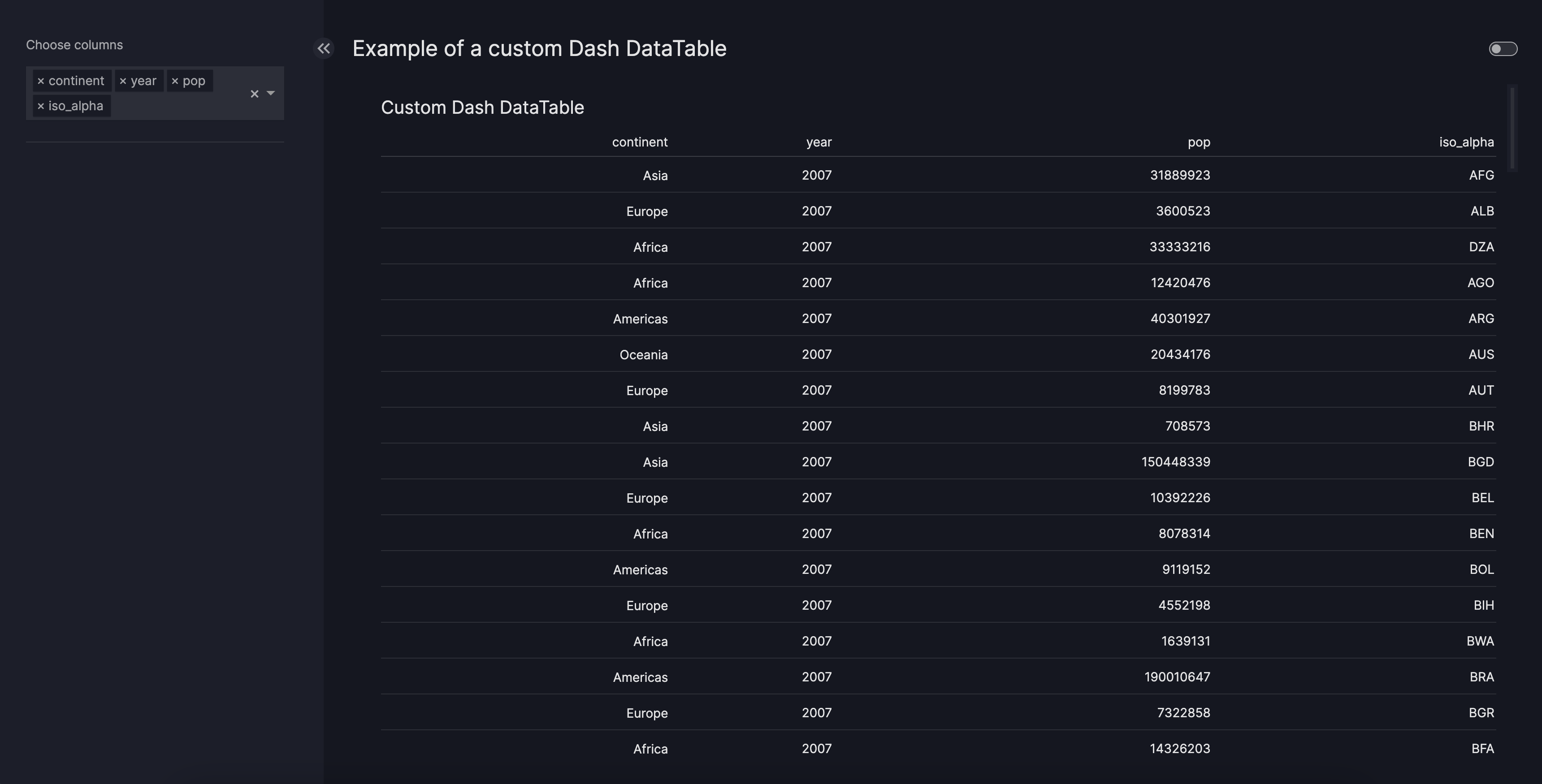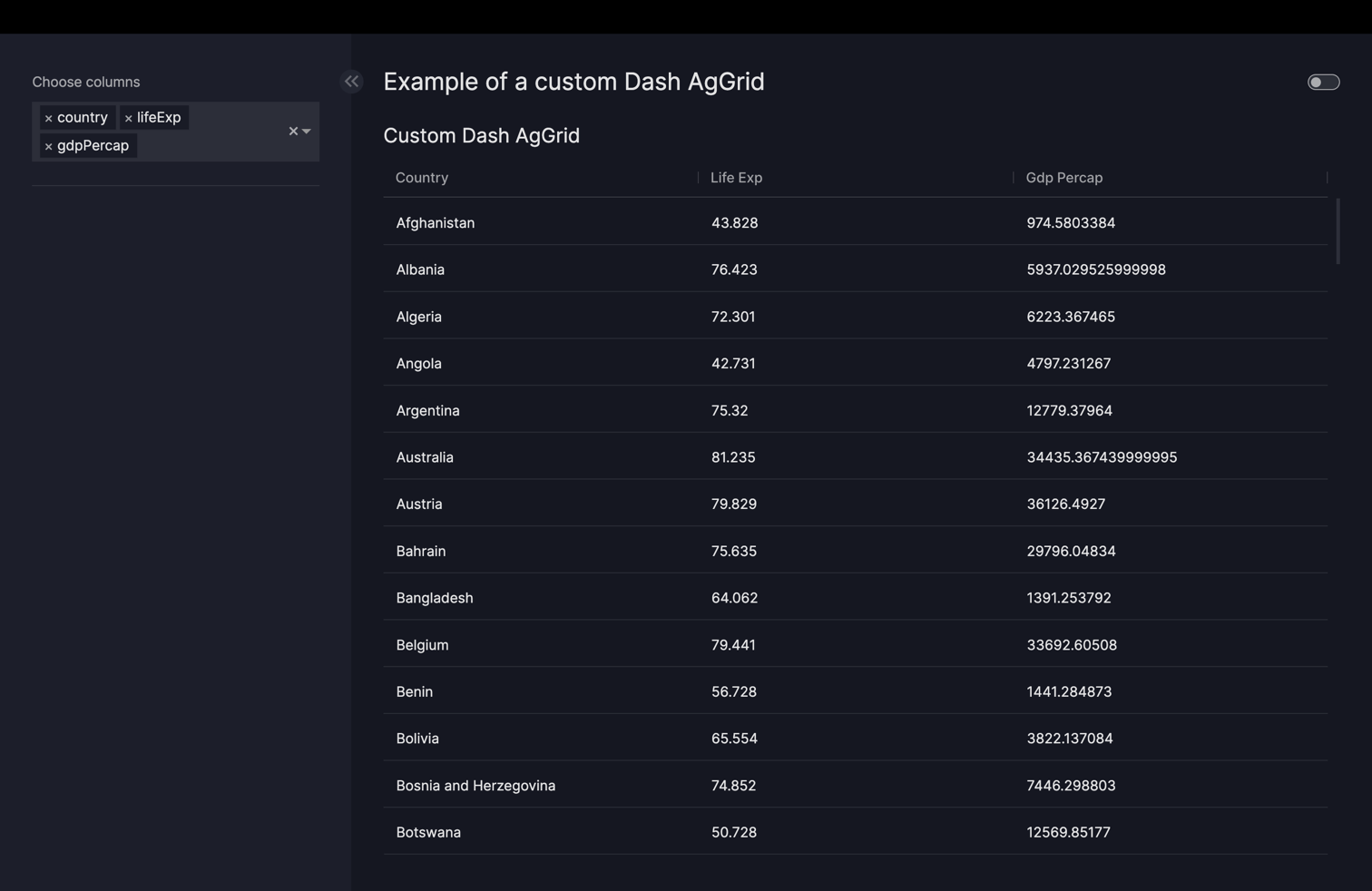How to create custom Dash AG Grids and Dash DataTables
In cases where the available arguments for the dash_ag_grid or dash_data_table models are not sufficient,
you can create a custom Dash AG Grid or Dash DataTable.
One reason could be that you want to create a table/grid that requires computations that can be controlled by parameters (see the example below).
For this, similar to how one would create a custom chart, do the following:
- Define a function that returns a
dash_ag_grid.AgGridordash_table.DataTableobject. - Decorate it with the
@capture("ag_grid")or@capture("table")decorator respectively. - The function must accept a
data_frameargument (of typepandas.DataFrame). - The table should be derived from and require only one
pandas.DataFrame(for example, any further dataframes added through other arguments will not react to dashboard components such asFilter).
The following examples show a possible version of a custom table. In this case the argument chosen_columns was added, which you can control with a parameter:
Custom Dash DataTable
from typing import List
from dash import dash_table
import vizro.models as vm
import vizro.plotly.express as px
from vizro import Vizro
from vizro.models.types import capture
df = px.data.gapminder().query("year == 2007")
@capture("table")
def my_custom_table(chosen_columns: List[str], data_frame=None):
"""Custom table."""
columns = [{"name": i, "id": i} for i in chosen_columns]
defaults = {
"style_as_list_view": True,
"style_data": {"border_bottom": "1px solid var(--border-subtle-alpha-01)", "height": "40px"},
"style_header": {
"border_bottom": "1px solid var(--state-overlays-selected-hover)",
"border_top": "1px solid var(--main-container-bg-color)",
"height": "32px",
},
}
return dash_table.DataTable(data=data_frame.to_dict("records"), columns=columns, **defaults)
page = vm.Page(
title="Example of a custom Dash DataTable",
components=[
vm.Table(
id="custom_table",
title="Custom Dash DataTable",
figure=my_custom_table(
data_frame=df, chosen_columns=["country", "continent", "lifeExp", "pop", "gdpPercap"]
),
),
],
controls=[
vm.Parameter(
targets=["custom_table.chosen_columns"],
selector=vm.Dropdown(title="Choose columns", options=df.columns.to_list(), multi=True),
)
],
)
dashboard = vm.Dashboard(pages=[page])
Vizro().build(dashboard).run()
Custom Dash AgGrid
from typing import List
import vizro.models as vm
import vizro.plotly.express as px
from dash_ag_grid import AgGrid
from vizro import Vizro
from vizro.models.types import capture
df = px.data.gapminder().query("year == 2007")
@capture("ag_grid")
def my_custom_aggrid(chosen_columns: List[str], data_frame=None):
"""Custom ag_grid."""
defaults = {
"className": "ag-theme-quartz-dark ag-theme-vizro",
"defaultColDef": {
"resizable": True,
"sortable": True,
"filter": True,
"filterParams": {
"buttons": ["apply", "reset"],
"closeOnApply": True,
},
"flex": 1,
"minWidth": 70,
},
"style": {"height": "100%"},
}
return AgGrid(
columnDefs=[{"field": col} for col in chosen_columns], rowData=data_frame.to_dict("records"), **defaults
)
page = vm.Page(
title="Example of a custom Dash AgGrid",
components=[
vm.AgGrid(
id="custom_ag_grid",
title="Custom Dash AgGrid",
figure=my_custom_aggrid(
data_frame=df, chosen_columns=["country", "continent", "lifeExp", "pop", "gdpPercap"]
),
),
],
controls=[
vm.Parameter(
targets=["custom_ag_grid.chosen_columns"],
selector=vm.Dropdown(title="Choose columns", options=df.columns.to_list(), multi=True),
)
],
)
dashboard = vm.Dashboard(pages=[page])
Vizro().build(dashboard).run()

